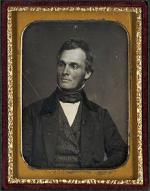Disable ads!
Robert Purvis
In 1833, Purvis helped abolitionist William Lloyd Garrison establish the American Anti-Slavery Society in Philadelphia and signed its "Declaration of Sentiments". Living for nearly the rest of the 19th century, Purvis was the last surviving member of the society. Also in 1833, Purvis helped establish the Library Company of Colored People, modeled after the Library Company of Philadelphia, a subscription organization. With Garrison's support, Purvis traveled to England to meet leading abolitionists. In 1838, he drafted the "Appeal of Forty Thousand Citizens Threatened with Disfranchisement"', which urged the repeal of a new state constitutional amendment disfranchising free African Americans. There were widespread tensions and fears among whites following Nat Turner's slave rebellion of 1831 in Virginia. Although Pennsylvania was a free state that had abolished slavery, state legislators persisted in passing this amendment to restrict free blacks' political rights. They did not regain suffrage until after the ratification of the Fifteenth Amendment in 1870, following the Civil War. From 1845-1850, Purvis served as president of the Pennsylvania Anti-Slavery Society, a biracial organization. As a supporter of the Underground Railroad, Purvis served as chairman of the General Vigilance Committee from 1852-1857, which gave direct aid to fugitive slaves. According to his records, Purvis estimated that from 1831 until 1861, he helped one slave per day achieve freedom, aiding a total of more than 9,000 slaves to escape to the North. He used his own house, located outside the city, as a station on the Underground Railroad. Purvis supported many progressive causes in addition to abolition. With his good friend Lucretia Mott, he supported women's rights and suffrage. When Mott was president, he was a member of the American Equal Rights Association. Purvis also attended the founding meeting of the Pennsylvania Woman Suffrage Association. He also supported temperance and similar social issues. He believed in integrated groups working for greater progress for all. By the end of the Civil War, which gained the emancipation of slaves and suffrage for black men, Purvis had reached his late 50s and became less active in political affairs.
 Read more on wikipedia.org Read more on wikipedia.org
 All quotes by Robert Purvis All quotes by Robert Purvis
 Edit Edit
|

|
|
|
|
|
Background photo by Giuliana
|